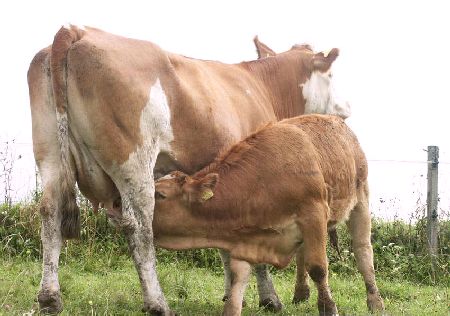It can also be expected that the production of adjusters for fattening will become more important in the future. Increasingly, these feeders will also be produced by extensive farming operations (extensive pasture, low labor input, early weaning date, etc.). The research project is therefore intended to address questions about extensive suckler cow farming using moderate forage quality.
Feed quality influences feed and nutrient intake and thus milk production, body condition, physiology as well as animal health, fertility and calf development and ultimately the profitability and nutrient cycle of suckler cow farms. Moderate basic feed quality leads to a significant and long-lasting nutrient deficiency in suckler cows during the nursing period and a corresponding decrease in body condition. Only with a weaning date that is adapted to the feed quality (the lower the quality, the earlier) can the body reserves be "filled up" again until the new calving, so that no negative influence on animal health and fertility is caused. As
part of this project, this is being done at the BAL Gumpenstein carried out an exact experiment with mother cows of the Fleckvieh breed. The effects on feed and nutrient intake, milk production and body condition development as well as nutrient supply and excretion, physiological parameters, animal and udder health, fertility, the development of the young cattle until weaning, and fattening performance were tested in fattening to meat quality and economic efficiency as well as ecologically relevant aspects (nutrient flows). In order to be able to work on the effect of the weaning date, the young cattle are weaned from the cows at 120 or 240 days.
In addition, data from an extensively farmed farm is also included Approximately 170 suckler cows ("Krutzler KEG" - Lafnitztal in Loipersdorf in Burgenland) were evaluated for animal health, fertility and performance.

Mother cow with calf
HBLFA Raumberg-Gumpenstein




